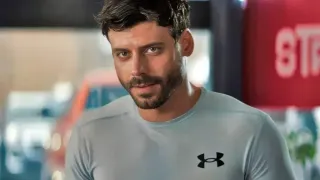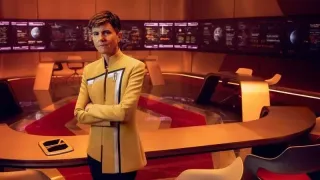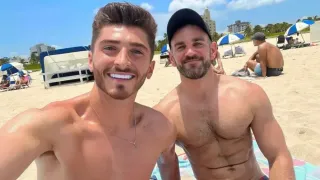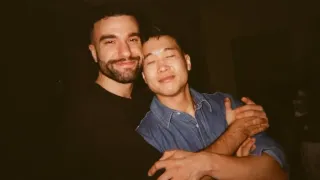September 14, 2021
The Way of the Force: Q-Force's Gabe Liedman
Gregg Shapiro READ TIME: 7 MIN.
Do you love to hear cartoon characters swearing and talking dirty? What about seeing them naked, muscular, and anatomically correct? Oh, and can you dig a story involving brainwashing, world domination and LGBTQ+ folks saving the planet? If so, the hot new Netflix series Q-Force is meant for you!
Featuring the voices of a stellar cast of queer and queer-friendly actors including Sean Hayes (Steve Maryweather aka Agent Mary), Wanda Sykes (Deb), Patti Harrison (Stat), Matt Rogers (Twink), Laurie Metcalf (V) and Gabe Liedman (Benji) in lead roles, as well as several other guest stars, Q-Force takes animation to a whole other level.
Liedman, who plays the love interest of hunky Agent Mary, also writes for, and co-created, the series. Gabe was good enough to make time for an interview in advance of Q-Force's September 2021 debut.
Gregg Shapiro: Gabe, your new project, the animated Netflix series Q-Force, is a perfect opportunity to ask if when you were younger, were you a follower of Saturday morning or primetime cartoon shows, or both?
Gabe Liedman: Both, definitely! My favorite Saturday morning was Garfield and Friends. I never missed it. U.S. Acres was my favorite part of that show. Primetime, I really was raised by The Simpsons. I used to watch it every week and run to school on Monday to quote all the best lines with my friends. We would memorize it; very much a huge fan of those two.
I interviewed you in 2014 about your feature film acting debut in "Obvious Child," alongside your friend and former performance partner, Jenny Slate. Jenny provided the voice for a character on Netflix's "Big Mouth," which made me wonder if that had any influence on your decision to be involved in an animated series?
It did not affect my decision, but there is a little bit of overlap in the world. I wrote for "Big Mouth"; I still do. We actually use the same animation house as them. They're called Titmouse. There is certainly a lot of overlap in our orbit. But no, this was a wholly independent choice on my part.
A recent episode of CNN's "History of the Sitcom" featured "Get Smart," Mel Brooks and Buck Henry's 1960s James Bond parody. Is that a show from which you find inspiration?
Absolutely! I did a lot of research. I watched a lot of old James Bond films, watched a little bit of "Get Smart." I wanted to see what the genre was like. I would say that one of the biggest influences on the show, though, was "Brooklyn Nine-Nine," which is a show that I used to write for. I consider that a bit of a training ground for me on how to tell these kind of case-of-the-week or short-arc case stories while still doing a show that's a workplace comedy about people. I looked mostly to my days at "Brooklyn Nine-Nine" when I was trying to make a decision.
On the same "History of the Sitcom" episode, the show also highlighted several classic animated series including "The Flintstones," "The Simpsons," and "The Boondocks." What would it mean to you have "Q-Force" talked about in the same breath with these other shows?
[Laughs] it would blow my mind! I don't think I'm there yet in my imagination. This is still such a baby, and it hasn't really been seen by anyone yet. I'm just sort of holding my breath, waiting for it to come out and see what people think of it. I know we worked really hard on it and had a ton of fun. If it got to live in in a lineup like that, I would just be blown away.
The lead actors providing voices on "Q-Force," including Sean Hayes as Agent Mary, Wanda Sykes as Deb, and Patti Harrison as Stat, read like an LGBTQ Who's Who, and each one is a great fit for the character. Which came first, the character or the actor providing the voice?
It was a little bit different with each character. Sean was a part of the show since its very inception. He and I developed the idea for it together with his producing partner Todd Milliner, and Mike Schur, the legendary television creator.
Sean was a part of it from the very beginning, and the rest of the cast came later. Wanda Sykes was Deb in my head from the moment I sat down to write it. It's always helpful for me to have an actor in mind when you're writing someone's dialogue, so that it sounds organic and authentic, like a personal talking. I chose Wanda because she's my idol, and I thought she'd make a great Deb.
She is great!
She just exploded my mind when she agreed to play the part. The rest of the cast came together piecemeal. Patti and Matt Rogers, who plays Twink, are comedians on the scene who I really admired and had somewhat of a relationship with. But Laurie Metcalf and David Harbour and Gary Cole and Dan Levy and Niecy Nash were actors I was a huge fan of, but our casting people just sent them the script. It was really just up to them and up to the strength of the writing as to why they said, "Yes."
I'm glad you mentioned Dan and Niecy, because the guest stars are another queer who's who, including Jane Lynch and Fortune Feimster, among others. Do you think there's a waiting list of performers who want to be turned into cartoon characters?
[Laughs] I was surprised that they were all down for it. I think that animation is a fun type of work. In regular, non-pandemic times, it's actually fun and easy to pop into a recording studio and bang out an episode or two in an hour. It doesn't really take much of actors' time. They don't have to get in makeup and wardrobe and do a bunch of takes and wait for the lighting to be done. It's something that I think actors gravitate to. It was much more difficult to do over Zoom, but we still did it. I was thrilled with who said yes. We really shot for the stars.
You provide the voice of Benji, the love interest of Agent Steve Maryweather. It's not the first time you are doing voice work. What do you like best about it?
When your body goes away and you're just your voice, you can really inhabit different types of characters you wouldn't be cast as based on your looks. I think it's a really freeing experience. I've played a mouse, which I'm not. It's much more imaginative acting. All the possibilities exist in front of you. You can really kind of do anything.
As with any parody, you have the chance to take digs at a variety of subjects, including all the gay Mikes, streaming services, and the corporatization of Pride, among others. Please say something about how animated characters can get away with saying things that flesh and blood folks can't.
When you're working in animation, it becomes a kind of fantasy world. The stakes are a little different. In the same way that we can blow up a mountain or jump out of a plane or put on Eurovision in a way that you really can't in live-action in a believable way, that also applies to the humor. You can push boundaries, or you can sort of slip stuff in because you're existing in this fantasy world.
When we were writing the show, I wanted it to just be fun and just be crazy and sexy and weird. I think that having that as the goal allowed for some of the politics and the more intellectual stuff to slip in. We weren't going hard on that stuff. Our goal was to be funny and have fun.
Debra Winger was recently in the news for an interview she did in which she talked about backing out of "A League of Their Own" because of Madonna's involvement.
[Big laugh.]
In "Q-Force," "Debra Winger has been in enough movies" is used as a trigger. Would you say that you are on Team Debra or Team Madonna?
[Laughs] Look, you're about to spark World War III here. I think I might be on both teams. I can't imagine "A League of Their Own" without Madonna. But I'd also loved to have seen it with Debra Winger. She's unbelievable. She's an incredible talent. But I [laughs] also have nothing bad to say about Madonna. I need to live in a world where they're both here. How's that?
That sounds great!
Help keep the Bay Area Reporter going in these tough times. To support local, independent, LGBTQ journalism, consider becoming a BAR member.






